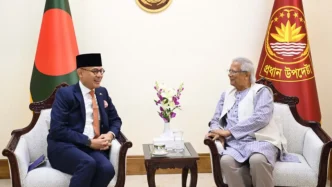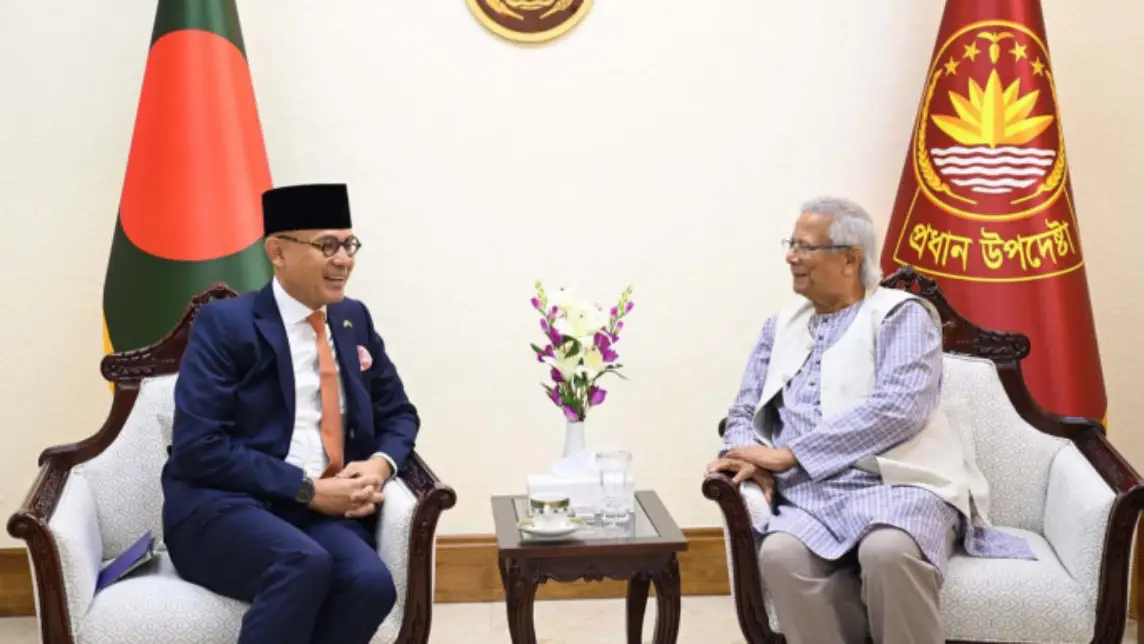In a significant step toward deeper bilateral engagement, Indonesian Vice Foreign Minister Arrmanatha Christiawan Nasir has called for enhanced trade, investment, and cultural connections between Indonesia and Bangladesh. The remarks came during a high-level meeting with Bangladesh’s Chief Adviser, Professor Muhammad Yunus, at the latter’s office in Tejgaon, Dhaka, on June 2, 2025. The discussions underscored a mutual desire to strengthen ties between the two Muslim-majority nations, with both sides expressing optimism about future collaboration across multiple sectors.
Building Bridges Through Trade and Investment
The meeting highlighted the economic potential of a closer relationship between Dhaka and Jakarta. Vice Minister Nasir, who is leading a trade and investment delegation to Bangladesh, emphasized Indonesia’s position as the fourth-largest import destination for Bangladeshi goods. He noted that Indonesian business leaders are eager to explore opportunities in Bangladesh’s economic zones, as well as its rapidly growing manufacturing and energy sectors. This interest aligns with Bangladesh’s ongoing efforts to attract foreign investment to bolster its economy, which has shown resilience despite global challenges.
Professor Yunus, a globally recognized figure for his contributions to social entrepreneurship, welcomed the prospect of increased economic cooperation. He stressed the need for stronger ties, lamenting that the two nations had not forged a closer partnership earlier despite shared cultural and historical roots. “We must become the closest of friends” said Yunus, highlighting the untapped potential in their economic relationship. Analysts suggest that such collaboration could yield significant benefits, particularly in sectors like textiles, agriculture, and renewable energy, where both countries have complementary strengths.
Beyond immediate trade prospects, the discussions also touched on long-term economic integration. Nasir’s delegation is reportedly exploring joint ventures that could position Bangladesh as a key manufacturing hub for Indonesian firms looking to expand in South Asia. While specifics remain under wraps, the focus on economic zones signals a strategic intent to leverage Bangladesh’s competitive labor costs and strategic location. If successful, such initiatives could pave the way for a broader economic partnership, potentially influencing regional trade dynamics.
A Push for Regional Influence and ASEAN Partnership
A key outcome of the meeting was Indonesia’s pledge to support Bangladesh’s bid to become a sectoral dialogue partner of the Association of Southeast Asian Nations (ASEAN), the influential regional bloc. Nasir affirmed Jakarta’s backing, a move that Professor Yunus described as a stepping stone toward eventual full membership in ASEAN. “We welcome Indonesia’s support and request their continued assistance in this endeavor” said Yunus, underscoring the strategic importance of closer ties with Southeast Asia’s political and economic powerhouse.
Bangladesh’s interest in ASEAN reflects a broader ambition to enhance its regional influence, particularly in the Indo-Pacific sphere. Nasir described Bangladesh as a vital player in ensuring peace and stability in the region, a statement that aligns with Jakarta’s own emphasis on regional security. For Bangladesh, deeper engagement with ASEAN could open doors to new markets and diplomatic platforms, while for Indonesia, supporting Dhaka’s aspirations strengthens its leadership role within the bloc. Observers note that this partnership could also serve as a counterbalance to other regional powers vying for influence in South and Southeast Asia.
However, challenges remain. Bangladesh’s integration into ASEAN frameworks will require navigating complex political and economic criteria, as well as addressing domestic priorities that may conflict with regional commitments. While Indonesia’s support is a significant boost, the path to full membership is likely to be a long-term process, with outcomes hinging on sustained diplomatic efforts from both sides.
Cultural and People-to-People Connections
Beyond economics and politics, the meeting placed a strong emphasis on fostering cultural and educational exchanges. Professor Yunus proposed visa-free travel for Bangladeshis to popular Indonesian destinations like Bali, arguing that such measures would encourage greater interaction between citizens of the two nations. “We are ready to go to great lengths to build a stronger relationship with Indonesia” he said, pointing to tourism as a gateway for deeper mutual understanding.
In response, Vice Minister Nasir highlighted existing initiatives, such as scholarships for Bangladeshi students to study in Indonesia and plans to invite Bangladeshi foreign ministry officials for diplomatic training programs. These efforts aim to build long-term bridges between the two societies, leveraging shared religious and cultural values. Both leaders expressed hope that increased people-to-people contact would lay the foundation for a more robust partnership, with cultural exchanges serving as a soft power tool to complement economic and political ties.
The focus on cultural diplomacy is particularly timely given the historical ties between the two nations, which share a legacy of Islamic heritage and post-colonial struggles for development. Experts suggest that initiatives like visa-free travel, if implemented, could significantly boost tourism revenues for both countries while fostering grassroots connections. However, logistical and security considerations may pose hurdles, and any policy changes will need careful coordination to ensure mutual benefit.
Addressing the Rohingya Humanitarian Crisis
One of the more pressing issues discussed was the ongoing Rohingya crisis, a humanitarian challenge that has strained Bangladesh’s resources for years. Professor Yunus sought Indonesia’s support in addressing the plight of the Rohingya, a Muslim minority group displaced from Myanmar, many of whom are sheltered in refugee camps in Bangladesh. “We need a peaceful resolution to the Rohingya crisis” he urged, expressing hope that Jakarta would play an active role at the upcoming UN conference on the issue in New York this September.
Nasir assured Yunus that Indonesia shares Bangladesh’s concerns and remains committed to assisting in resolving the crisis. As a prominent member of ASEAN, Indonesia has previously voiced support for addressing the root causes of the Rohingya displacement, including advocating for dialogue with Myanmar. This stance reflects Jakarta’s broader commitment to humanitarian issues within the region, though its ability to influence outcomes may be limited by ASEAN’s consensus-driven approach and Myanmar’s internal complexities.
The Rohingya issue remains a litmus test for regional solidarity, with Bangladesh bearing a disproportionate burden as host to over a million refugees. While international attention has often focused on immediate aid, long-term solutions—such as repatriation or integration—remain elusive. Indonesia’s involvement could help amplify Bangladesh’s calls for global action, though tangible progress will likely depend on broader geopolitical dynamics, including the positions of major powers like China and India.
Looking Ahead to a Strategic Partnership
The meeting between Professor Yunus and Vice Minister Nasir marks a pivotal moment in Bangladesh-Indonesia relations, setting the stage for a multifaceted partnership. From trade and investment to cultural exchange and regional diplomacy, the discussions reflect a shared vision of mutual growth and stability. For Bangladesh, closer ties with Indonesia offer a gateway to Southeast Asia’s economic and political networks, while for Indonesia, supporting Dhaka aligns with its ambitions as a regional leader.
Yet, the road ahead is not without obstacles. Economic collaborations will require sustained policy alignment and private sector engagement, while cultural initiatives like visa-free travel must balance openness with security concerns. On the diplomatic front, Bangladesh’s ASEAN aspirations and the Rohingya crisis will test the depth of Indonesia’s commitment, as well as the limits of regional cooperation.
As both nations navigate these challenges, the goodwill expressed during this meeting offers a promising foundation. With Professor Yunus’s vision of becoming “the closest of friends” echoed by Indonesian counterparts, the coming months could see tangible steps toward a partnership that reshapes regional dynamics. For now, stakeholders in Dhaka and Jakarta alike are watching closely, hopeful that this renewed engagement will yield lasting benefits for their peoples and the broader Indo-Pacific region.
















